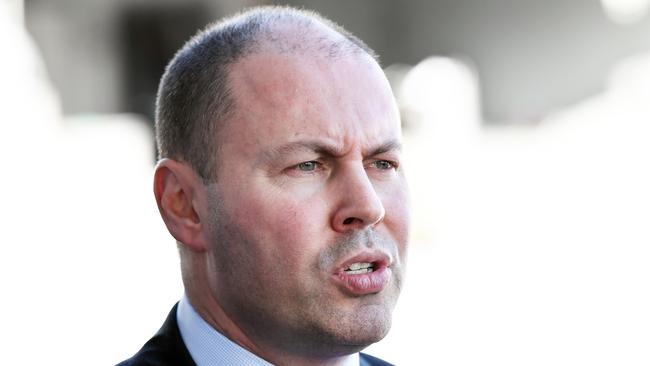Frydenberg: Banks asking couples about IVF is ‘highly inappropriate’
One of the big four banks asked a young couple to stop their costly IVF treatments if they wanted to have access to a modest home loan.
NSW
Don't miss out on the headlines from NSW. Followed categories will be added to My News.
One of the big four banks asked a young couple to stop their costly IVF treatments if they wanted to have access to a modest home loan.
A home loan assessor for one of the big four advised the couple’s mortgage broker, in writing, that if they were to be eligible for a $600,000 mortgage, they had to confirm there would be no additional costly IVF treatments.

After significant pushback from the broker, the bank eventually withdrew this unfair condition on getting a home loan.
It comes as RBA data shows that housing loans is growing at its slowest annual pace, of 3.3 per cent, in the 42 year history that the data has been collected.
Treasurer Josh Frydenberg, who has obtained all the documentation around the case, said this is one of many instances that have come to his attention where hardworking Australians are unable to access credit in the wake of the Hayne Royal Commission into misconduct in the banking sector.
“This is an unfortunate and extreme example of where bank customers are being asked to justify expenses of a truly personal nature,” Frydenberg told The Daily Telegraph.
“Not only can this unnecessarily contain the flow of credit but it also appears to be highly inappropriate.”
Mr Frydenberg declined to state the name of the bank that put the couple in such a difficult position of choosing between a dream of a family or a home.
He learned of the case in Queensland this week when a local MP introduced him to the mortgage broker.

According to RBA data, banks lending money to investors is growing at its slowest pace on record, increasing just 0.3 per cent in the year to July 2019.
Overall, loans have slowed to 3.1 per cent in July 2019 — half what it was three years earlier.
Mr Frydenberg gave a speech this week warning of the economic consequences if “responsible lending laws be applied too stringently”.
“Common sense dictates that a sensible balance needs to be struck because an unduly restrictive application of these obligations can do as much harm as an overly lax one,” he said.
“It is in everyone’s interest that the aspirations of hard working families are not collateral damage in this regulatory process.”
Mr Frydenberg and Prime Minister Scott Morrison are concerned about the impact the tightening lending criteria is having on the economy.
Speaking at the American Australian Association reception in New York this week, Mr Morrison said without banks supporting business loans, potential start-ups would remain just a “story in a bar.”
“It goes somewhere when someone puts some money down and that’s something so important so our Government is going to work very hard to ensure that we continue to encourage our banks not just to do the right thing but by their customers as they must and should but also to make sure they continue to lean into the economy,” he said.
Over the past year, the criteria to qualify for a loan has become significantly more stringent, as loan assessors pour over every transaction or withdrawal made over a 12 month period.
It comes as the Reserve Bank Governor, Dr Philip Lowe is expected to further lower interest rates to emergency levels this week.
